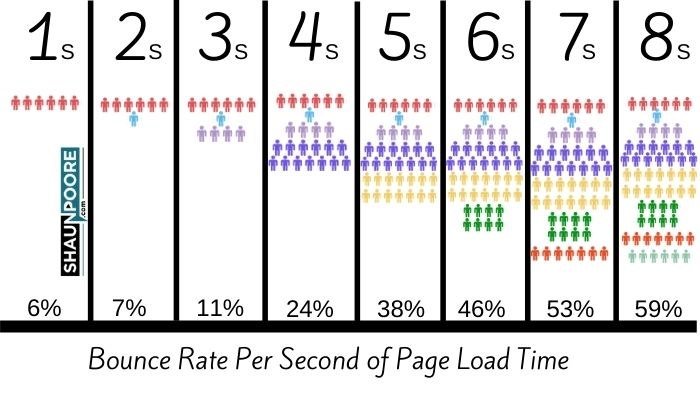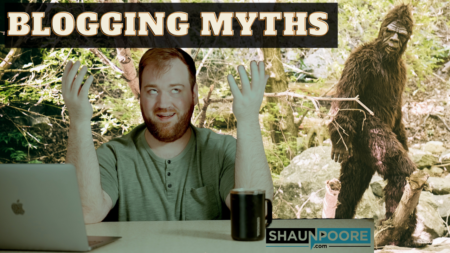When I started blogging, I got a lot of bad advice from “experienced bloggers.” To help new bloggers, here’s my list of the bad advice you’ll get.
Myth #1) Site Speed is Important To Ranking in Google
Want to rank higher in Google? Make sure your site loads super fast! It’s even more important on mobile! Wait, will this actually improve my ranking at all?
Don’t get me wrong, we should all strive to have a faster website. Users start bouncing from your site en-masse after waiting for about 3 seconds. If your site takes longer than that to load, you’re throwing away good traffic. Particularly on mobile.

That said, will a slow site tank your Google rankings in early 2025? We’re all waiting for Core Web Vitals to become very important to the algorithm, but in the mean time check out the top results for the following competitive queries.
| Query w/Link to #1 Result | Mobile Page Speed Score | Desktop Page Speed Score | Mobile First Meaningful Paint | Mobile Speed Index | Mobile Time to Interactive |
|---|---|---|---|---|---|
| How To Start a Business | 6 | 54 | 9.6s | 11.1s | 26.5s |
| How To Lose Weight | 23 | 82 | 8.7s | 6.6s | 9.2s |
| Best Credit Card | 32 | 47 | 3.7s | 15s | 35.9s |
| Buy a car online | 27 | 69 | 4.6s | 8.1s | 16.5s |
| Failure Mountain Why a business partner is a bad idea | 100 | 100 | 1.1s | 1.1s | 2.0s |
These sites rank #1 for the most sought after queries on the Internet, and they’re all slower than my website. If Google gave a lot of weight to site speed, these sites wouldn’t rank #1 (somebody would just make a faster site). Clearly site speed is at best a tie-breaker.
Myth #2) Spend 80% of Your Time Promoting Your Content
I don’t want to spend all day bashing Neil Patel on this blog. I bring him up because he says to spend 80% of your time promoting and 20% of your time creating content over and over.
This advice isn’t wrong per se, it’s just that this advice is definitely for Neil Patel and not a brand new blogger.
What do I mean by that? If I load up Neil Patel’s sitemap.xml right now, I can see that he has over 5,000 blog posts. If I head on over to his YouTube channel, I can see he has over 500 videos!

Neil Patel telling you not to focus on content creation is like a cat-lady telling you to get a dog. Maybe that’s good advice, but then why did this person collect so many cats?
Once you hit your 5000th blog post like Neil Patel, then focusing all your efforts on marketing starts to make a lot more sense. At that point, it’s OK advice.
But, new bloggers probably haven’t even written 50 posts yet. Creating your 19th post is a bigger deal than marketing is. Creating your 33rd post is a bigger deal than marketing is. Focusing 80% of your time on marketing when you barely have any content makes no sense.
Myth #3) Higher Word Counts Will Skyrocket Your Posts Rankings
Brian Dean over at Backlinko claims longer content ranks better.
I have so much to say about this. The first thing is that correlation is not causation. In fact, correlation does not even imply causation.

What Brian Dean is saying is that on average, the #1 ranked post had 1,950 words, and the average #10 ranked post had 1,750 words. Ergo, write 2,000-word posts to rank in Google.
Ugh. Just ugh. This has a lot of problems with it, I’ll just list off a few.
- An average skews the data upward. If you make two Google queries. One top result has 100 words and another top result has 10,000 words. It has an average of 5050 words. We should all write 5,000 words blog posts now, right?
- Data-set will alter results. The query you use will alter the outcomes significantly. If his sample set included queries like “What’s the weather today,” you’re going to get shorter posts. We don’t know the queries he tested and whether they caused biased results or not.
- Chicken or the Egg. If SEO experts started telling everybody to write 500-word posts tomorrow, then all posts would begin to trend towards that length.
Write your content as long as it needs to be. If you thoroughly cover searcher intent in your post, you will be rewarded for it more than reaching an arbitrary word-count.
Myth #4) Keyword Research
Remember the “Food Pyramid?” It looks a little something like this.

In 1995, this was how we all learned you were supposed to eat. Somewhere between then and 2025, we all realized it was wrong. Despite that, millions of Americans exist today that never got the memo.
Keyword research is a lot like the food pyramid. It died. We’ve all accepted that and moved on as a society… Well, except for all the people who haven’t.
If you’ve been blogging for any amount of time, you’ve probably heard somebody talk about a keyword golden ratio. Or making sure a keyword is in the top-level of your domain. Or trying to cram as many keyword synonyms as possible into your post’s header tags.
This was good advice during the George W Bush administration. But, in the ’20s? It’s time for this to die. Matt Cutts personally disavowed keyword density as being a thing in 2011. It’s not a thing.
Myth #5) You Need To Write Guest Posts
I wrote an entire blog post on this subject if you want the extended version. The short version is that people try to sell you that you need to be doing lots of guest posting to get backlinks and it’s BS.
There are only two valid reasons to ever write a guest post.
The first is if the other blog has an audience of people with a high probability of wanting to buy your product. So if you’re a blog about Peanut Butter and the popular jelly blog wants you to guest post, by all means, do it.
The other is if a site with a domain authority that’s so high you can’t even fathom it asks you to guest-post. We’re talking FBI.gov, nytimes.com, harvard.edu type of sites. Like THE biggest players on the Internet. Otherwise, forget it.
Why? Because the posts you write on your blog will naturally acquire way more than 1 backlink over time. Sometimes from sites with some pretty decent domain authority.
Not every post you write will acquire hundreds of backlinks. But, if you write 100 posts, odds are at least one of them will get popular enough to earn hundreds of backlinks.
You’ll get more backlinks by posting to your own site. So why are you begging other bloggers to take your hard work for free? Please stop doing this.
Myth #6) You Need To Build Backlinks
Backlinks help your site rank. I’m not denying that.
That said, our methods for acquiring backlinks suck. The best ways we’ve come up with are as follows.
- Guest posting (see above)
- Spamming Websites with broken link campaigns (websites consider this spam now).
- Help a Reporter Out
Out of these 3 options, help a reporter out is the only one I’d even consider. And even that will cost you a lot of time.
You have to ask yourself about the opportunity cost of a link-building campaign. How many quality backlinks are you actually getting per 8 hour day of spamming people? If you simply created content instead, would you get more?
For most people, the answer to that is “Yes!” They would get more quality backlinks from content creation than spamming other websites. So please stop doing it.
Myth #7) Google Adsense and Amazon Affiliates is How You Make Money Blogging
I don’t think you should put ads on your website. And tons of affiliate programs pay better than Amazon. Creating your own product will pay orders of magnitude better than the other two models combined.
Yet we live in a world where communities exist around building affiliate sites. Are we living in crazy town? You’re doing all this work to make pennies when you could be making some serious cash.
A $15 RPM (revenue per 1000 page views) is a pretty good rate for ads. Amazon’s cookie is only 24 hours long, and they only give you a 4% commission. So I wouldn’t expect Amazon to beat a $15 RPM either.
Having your own product will destroy a $30 RPM. If you created a product with a $30 margin, you only need to sell it to 1 out of 1000 visitors to hit those numbers. And most bloggers don’t see a $30 RPM from their websites.
Myth #8) Blogging is Dead
I wrote an entire post on this topic. Here’s what you need to know.
- Competition is increasing. Google is pushing video and snippets in the SERP now. YMYL topics are harder to break into. Ranking blog posts in Google is getting more difficult over time.
- More people use Google and every other web platform more than ever before (Facebook, Pinterest, Twitter, Quora, Reddit).
- People are buying more things online than ever before.
Blogging is more competitive now. But, there’s more traffic to go around, and it’s easier to monetize than ever before. It’s still a good time to start blogging as of 2025. Although I’ll admit, YouTube is a better opportunity right now.
Myth #9) Keyword Research Tools Can Predict Search Volume
I wrote an entire post on this one too.
There are only 3 ways to get Google search volumes.
- Winning the keyword phrase on your own blog and seeing the actual traffic data.
- Using the Google Keyword Planner Tool for traffic data.
- Using Clickstream data. (Capturing a sampling of search queries and using that to project traffic volume.)
Obviously, keyword research tools can’t rank for every keyword on the Internet, so method 1 doesn’t work.
The Google Keyword Planner has some obvious flaws as well.
- It’s broad match and not exact match. What this means is it combines the traffic estimates for “low carb diet plan” and “low calorie recipes.” (Those are very different queries).
- It’s estimating the number of ad impressions you might get for that keyword, not total search volume.
- It rounds estimates into buckets. So 0-1,000, 1,000-10,000 etc. This is a problem for small long-tail search queries as they all round to 0.
OK, so GKP can’t estimate search volumes either. How about Clickstream data? Wait, what is Clickstream data again?
Clickstream data is when you install 3rd-party desktop software and don’t read the terms very well. They capture your entire browsing history and sell it off to keyword research tools. These tools will multiply this small sample set of data to guess the traffic volume.
Clickstream data obviously has some flaws as well. The biggest one is long-tail keywords will never be appropriately represented as the sample size is too small. Oh, and most queries on the Internet are long-tail.
Myth #10) Post Frequency Matters
What’s the optimal number of times to post per week to rank in Google? I guarantee you’ve heard somebody say this before. Users like regular content, and so does Google, right?
Matt Cutts said this was false almost a decade ago. Don’t believe me? Here’s actual the video of him saying it. Why has no-one gotten the memo?
For a new blogger, frequency doesn’t matter. The only way that posting every day benefits you is that by the end of the year, you’ll have 365 pieces of content. More content gives you more chances to rank in Google.
However, writing a post daily or weekly, then taking a two-month vacation, is no big deal in the eyes of Google. Post frequency doesn’t matter.
Myth #11) You’re Missing Out if You’re Not on Social Platform X
Every few years, a new social platform pops up and becomes the new hot thing.
I won’t go over each social platform because that would take forever. So let’s go with Facebook because most social platforms will have the same arc.
A little over a decade ago, Facebook launched “Facebook Groups.” At the time, it was super easy to create a group and get tons of people to join it with no investment. For a long time, this was fantastic for marketers. Entire businesses popped up solely reliant on these groups for traffic. Well, until this happened.
Facebook felt groups were becoming marketing spam and so they hit the mute button on it. Hard.
I’m not saying you should avoid social platforms. I’m just saying anybody telling you you must get on Facebook now hasn’t gotten the memo. Not that it wouldn’t have been beneficial to get on Facebook during the boom, but the boom ended years ago.


